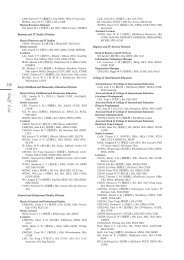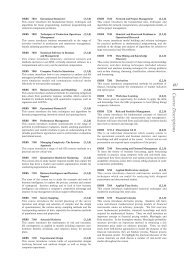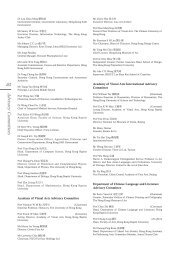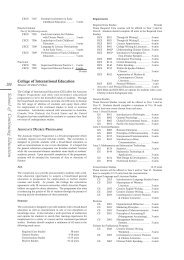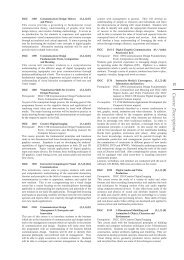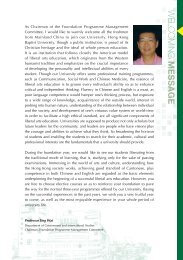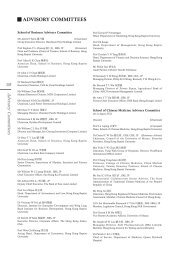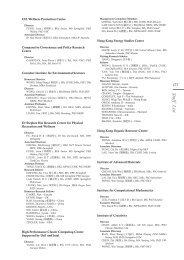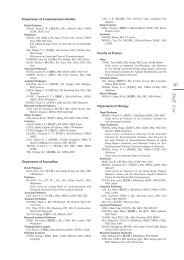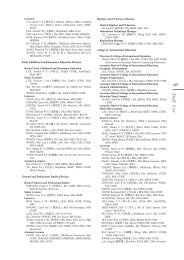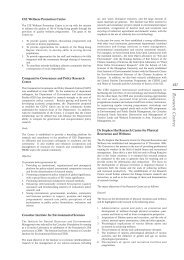350<strong>Course</strong> <strong>Descriptions</strong>students, after taking this course, will be able to appreciate theAsian traditions and to analyse some current issues in Asia fromcultural perspectives.GCHC 1046 The Rise of Contemporary China (3,2,1) (E)This course aims to introduce contemporary Chinese historyfrom 1949 to the present. It discusses the rise of Communism inChina, the different political movements (campaigns), the role ofMao Zedong and other political leaders in shaping the country’sdevelopment, and the relaxed outcomes and problems. Then, thecourse assesses the contribution of Deng Xiaoping and the FourModernizations. It also traces the various economic policies from1949 to the present.GCHC 1047 Traditional Chinese Culture and (3,2,1) (C)the Contemporary WorldFor quite a long time, Western thinkers and their non-Westerndisciples, having great faith in science, rational reasoning,universalism, progress, individualism, etc., rejoice the “depreciationof the old and traditional” in modern society. For them, traditionsstand in the way of modernization that promises them “permanentinnovation” and “continual creation of the new”. However,social and cultural problems of contemporary Western societyand the enviable development of non-Western societies in the lastdecades compel them to believe that “modernity does not dissolvetraditions, but rather they serve as resources for modernity'sperpetual constitution and reconstitutions.” (S Eisenstadt) Thiscourse, with its focus on the cultural dynamic of the Chineseculture in the contemporary world, explain what solutionsdifferent Chinese schools of thoughts such as Confucianism,Daoism and Buddhism can offer to contemporary social andcultural problems.GCHC 1055 Music, Society and Culture (3,3,0) (E)The course addresses changes in and the significance of musicalstyles and music-making, and the functions of art music andpopular music in society. Specific topics explored include thepractice and value of music in musical culture; music and socialmeaning; music and politics; music and gender; music in worship;the construction of music markets; the globalization of musicproduction; and production and reproduction technologies.GCHC 1056 Musical Civilizations of the (3,3,0)East and WestThe course provides a broad perspective of exploring civilizationsof the East and West by investigating the development of music,from the angles of history, culture, theories and performancecontext. Students will learn to appreciate a selected repertoire ofmusic, including Western classical music and music from China,Japan and Korea, and trace their origins through appreciating,analysing and working out how particular pieces are evolved. Itwill be possible to make a connection between music and otherdisciplines, such as literature, visual art, dance, drama and rituals.Parallels drawn between the different musical cultures allowstudents to develop a global and critical attitude in appreciatingmusic, which can then be extended to other arts. It is envisagedthat traditional geographic and cultural boundaries will beminimized, as a comparative approach is adopted in handlingmusic of different cultures.GCHC 1057 Chinese Popular Music: Its (3,3,0) (C)Cultural and Musical MeaningsThis course introduces students to the history, style characteristics,and sociopolitical meanings of Chinese popular music from theMainland, <strong>Hong</strong> <strong>Kong</strong> and Taiwan. Its aims are three-fold: (1)to help students develop the listening skills to differentiate themusical/style characteristics of different types of Chinese popularmusic from different eras; (2) to provide students an overviewof the trends and developments in Chinese popular music in thecontext of the PRC, Taiwan and <strong>Hong</strong> <strong>Kong</strong>’s sociopoliticalhistory; (3) to foster students’ critical abilities through examiningthe various meanings of popular music in the larger context ofpopular culture and in relationship to issues of gender, identity,globalization, marketization, politics, subculture, etc.GCHC 1065 Music, the Arts, and Ideas (3,3,0) (E)Through examining how music and our musical tastes andactivities form an important part of our personal and culturalidentities, this course will provide an introduction to aesthetics—the philosophy of art—from a music perspective. Students willbe introduced to (1) questions about the nature of music (and artin general) and the nature of musical creation in a non-musicaltechnicalmanner; (2) major Western philosophical theories aboutmusic from antiquity to the 20th century; (3) problems in criticallyand aesthetically evaluating music of all kinds, from the popularmusic industry, to traditional musics, to the Western classicalrepertory; and (4) some current topics in music with philosophicalramifications, including culture and copyright, politics and music,and music as a commodity in advertising and media. Individualinstructors may emphasize particular areas of expertise in music,aesthetics, and philosophical discourses.GCHC 1066 Paradigm Change of Christianity (3,2,1)and Its Impact on Western IndividualCultural and Social LifeIn the course of development of Western history, Christianity asa paradigm underwent several changes in response to the socialand cultural challenges in the West on the one hand, and insertingsignificant impacts on the Western society and individuals on theother. This course will use Thomas Kuhn’s theory of paradigmchange and Hans <strong>Kong</strong>’s analysis on Christianity as foundation,through which its impacts on individual spirituality and social life,aesthetics, economics and politics in the West will be examined.This course will study the development of Christianity as westernweltanschauung in the first four centuries after Jesus Christ, andthe Renaissance and the Reformation and see how they affectedthe individual, cultural and social life in Europe.GCHC 1067 Religious Conflicts and Social (3,2,1)Harmony in the WestThis course examines major episodes of religious conflicts inthe West, identifying major trends and historical figures thatare inherent in them. Special attention would be paid to howthese conflicts fizzled or played themselves out, resulting in nearpermanent states of social harmony which have effectively grownpast such conflicts. The evolution and nature of such harmoniousstate are particularly interesting to all religious people, who wanttheir religions to play positive rather than negative roles in society.GCHC 1075 The Power of Ideas (3,2,1)This course will study the correlation between historical and socialchanges to some of the important ideas in religion, philosophy,science and technology. Students will learn to grasp the basicmethod of reading and interpreting great historical documents andgreat books which form the conceptual groundwork of moderncivilization.GCHC 1076 (3,3,0) (P)The History of Chinese Medicine Developmentand Chinese CivilizationThis course aims to introduce the formation and development ofthe most important philosophy of Traditional Chinese Medicine(TCM), and its relation to the Chinese civilization. It will helpthe students to use different perspectives to think of the interdependenceand impacts between the two. Upon completion ofthis course, students should be able to use different perspectivesto think of the formation and development of the philosophyof other disciplines and their relation with the civilization in thesociety.GCHC 1077 Understanding the 20th Century (3,3,0)through FilmAs the 20th century is the century of media technology andrepresentation, cinema comes forward as the pivotal institution.The course aims to demonstrate and illustrate major events of
the period with a special focus on aesthetics, narrative structureand spectacle. The birth of cinema in 1895 affords a pictorialandlater audiovisual-representation of key developments in everysociety: urbanization, technology, globalization of warfare andsocioeconomic transformation. It also comes to play a crucialrole in modernization and circulation of contemporary trends andnorms. Cinema itself evolves into an institutional, industrializedforce that later gives rise to television, the internet and otherpostmodern forms of infotainment. Films thus can be framed asdevices for visualizing and imagining the 20th century.GCHC 1085 Human Civilization, Cultural (3,3,0)Heritage and LandscapesIn the long period of human civilization, people have createdmany magnificent historical landmarks and cultural landscapes.The course will introduce students to the concept of civilizationand cultures. In particular, cultural heritage and landscapes willbe discussed as products of human history, civilization, cultures,and physical spaces. By using both local and worldwide examples,the course will assist students in acquiring the skills to observe andinterpret cultural landscapes.GCHC 1086 The Making of Humankind (3,3,0)The course will present an alternative history demonstratinghow non-traditional approaches (archaeological, geological,science archives) can tell stories from the past. An introductionwill be given to the history of planet Earth and how events inthe distant past have determined the nature of, and limits to, ourmodern civilizations. A more intensive narrative is developeddealing with human pre-history and the initiation of the earliesthuman cultures. The main focus will be on understanding ourown ancestors and their spread across the world. Their culturaladaptations will be discussed by examining the developmentof stone tools, the origins of art, the earliest forms of writing,and the shift from hunter-gathering to agricultural and fishingactivities and, subsequently, to the rise of the earliest civilizations.Questions will be raised as to what may happen to us in the future,given the evidence of our past.GCHC 1087 Collective Memories, Constructed (3,2,1)Cultures: The European MuseumThe course will introduce the major European cultural centers,which have developed around the existence of large-scale publicmuseums. Students will study the origins of such museums, theirevolving structures (including attendant research institutions) andfunctions, and the controversies surrounding their collections andactivities in past and present. Emphasis will be given to their rolein heritage conservation and national identity building, as well astrans-national cultural research, dialogue and conflict. The coursewill finally discuss contemporary approaches to commoditizemuseums while at the same time sustain their capacity to influencenational and global cultural discourse.GCIT 1005 Essential IT for Enterprises (3,1,2) (E)and SoHoThis course aims to provide students with an overview of thebusiness IT environments from large enterprises to SoHo (Smalloffice Home office). It covers key concepts of informationtechnology, specially addressing the opportunities it brings to thebusiness world at large, and SoHo startups in particular. Thiscourse also aims to let students experience how informationtechnology increases the efficiency and productivity in theworkplaces. It covers topics including e-commerce, e-marketing,network security, intellectual property, etc. Practical knowledgeon business applications such as spreadsheet, database and webportal management software will also be stressed.GCIT 1006 IT for Success in Everyday Life (3,1,2) (E)and WorkThis course aims to prepare students for the challenges oftheir everyday life and work by equipping them with practicalknowledge and skills to engage in fast-moving informationtechnology. Its main thrust is the incorporation of essentialforward-looking IT concepts illustrated with real-world examplesand coupled with hands-on experiences in the support of problemsolving and creative application of IT.GCIT 1007 IT and Digital Media (3,1,2) (E)Due to the advancement of information technology, moretraditional media, like photo, music, movie, etc, have becomedigital and some also contain interactive elements like computergames. Digital media even change our daily experience, like theway of advertising. This course aims to introduce the key ITconcepts behind different digital media, explain the proper use ofIT to better manage them, as well as how the evolution of digitalmedia affects different aspects of our daily life. This course alsoaims to introduce various digital media software tools and letstudents experience the content creation of various digital media.GCIT 1015 IT Innovations Shaping Our World (3,1,2) (E)This course aims to equip students with knowledge on the keyIT innovations that are shaping our world, including the latestdevelopment of digital media technology, the advancement ofdigital communication technology, and the development of smartIT systems, for digital media technology, this course covers lateststandards and basic scientific principles of digital imaging, digitalTV and digital music, this course also introduces the key of ITinnovations in telecommunications and wireless technologies.GCIT 1016 Life-long Learning with (3,1,2) (E)Information TechnologiesThis course is designed to develop students’ understanding aboutthe theories behind various IT-supported learning strategies. Itfocuses on the enhancement of learning by adopting a varietyof IT-supported learning strategies. With both theoreticaland practical components, this course aims to enable studentsto explore their individual learning style and consequentlydevelop their own learning methods with the appropriate use oftechnologies to cater for their study needs in university settingsand for life-long learning.GCLA 1005 <strong>University</strong> Chinese (3,2,1) (C) (P) This course comprises three teaching and learning units: 1)Practice on speech and debating skills; 2) Critical reading andwriting; 3) Advanced language knowledge. The objectives ofeach unit are: Unit 1: To examine the strategies and techniquesof speech and debate, and to improve the debating and publicspeaking competence of students through practice; Unit 2: Tointroduce students to the theories and strategies of critical readingand writing, and to guide students in writing critical readingreviews of an academic, expository or argumentative nature; Unit3: To equip students with advanced Chinese language knowledgefor a better understanding of the cultural elements of Chineselanguage and the enhancement of effective communication.GCLA 1008 <strong>University</strong> English I (3,2,1) (E)Important contemporary themes are selected to motivate andengage students in thought-provoking and purposeful use ofEnglish. The themes also provide a framework for a diversity ofmultimedia materials, including academic texts, news reports,magazine articles, web articles and videos, TV and radioprogrammes, etc. Students will have extensive opportunities toread and listen to, as well as discuss and write about, major issuesarising from each theme, thereby improving both their languageproficiency and their intellectual maturity and cultural knowledge.Generic academic and professional skills (summary writing,graph/table description, discussion strategies, etc.) are distributedand explicitly practised in the course.351<strong>Course</strong> <strong>Descriptions</strong>
- Page 3 and 4: economic growth, trade, pollution,
- Page 5 and 6: specific empirical economic problem
- Page 7 and 8: of private enterprises in the indus
- Page 9 and 10: period. The first part of the cours
- Page 11 and 12: The reactions and effectiveness of
- Page 14: 314Course DescriptionsEDUC 3080 Tea
- Page 17 and 18: development of children and adolesc
- Page 19 and 20: and communication skills in differe
- Page 21 and 22: y ubiquitous technology. Learners w
- Page 23 and 24: ENG 2650 Topics in English Grammar
- Page 25 and 26: clause structures of the English la
- Page 27 and 28: adopted for reading and interpretin
- Page 29 and 30: drama; and (2) introduce Western dr
- Page 31 and 32: ENGL 4005 Advanced Topic in Compara
- Page 33 and 34: attendant to the break-up of mediev
- Page 35 and 36: EURO 3205 Comparative Politics of (
- Page 37 and 38: states, enlargement provides signif
- Page 39 and 40: to create and develop ideas via rel
- Page 41 and 42: strategies of awarded campaigns to
- Page 43 and 44: characteristics of films, film-make
- Page 46: 346Course DescriptionsFINE 1005 Fin
- Page 49: GCHC 1005 China and the Global Econ
- Page 53 and 54: est decision-making procedures. Mor
- Page 55 and 56: GCPE 1065 Table Tennis (1,2,0) (C)T
- Page 57 and 58: and/or philosophical traditions the
- Page 59 and 60: on the use of English in various se
- Page 61 and 62: GDAR 1835 Music, Mind, and Human (3
- Page 63 and 64: lead to successful development of n
- Page 65 and 66: management and proactive stakeholde
- Page 67 and 68: GDCV 1065 Buildings of Hong Kong: (
- Page 69 and 70: of various religions that broaden t
- Page 71 and 72: their implications for contemporary
- Page 73 and 74: gone through since 1945 included th
- Page 75 and 76: GEOG 1005 Geography and the Contemp
- Page 77 and 78: students to the concepts and techni
- Page 79 and 80: GEOG 3730 Energy Policy and Analysi
- Page 81 and 82: processes interact with China’s s
- Page 83 and 84: GERM 1006 German II (3,3,0) (G)Prer



